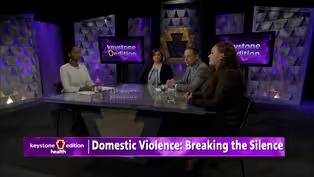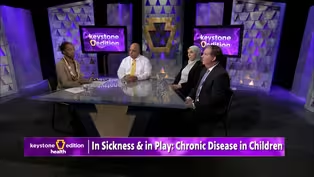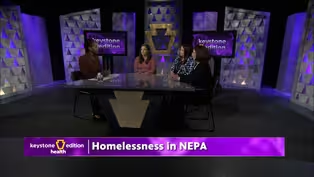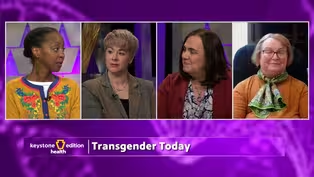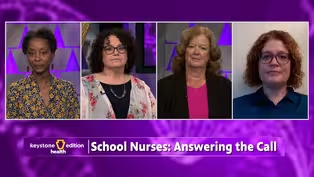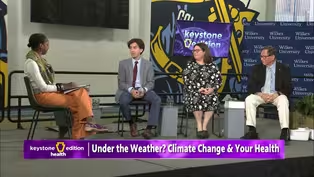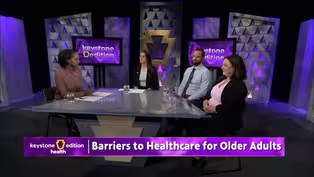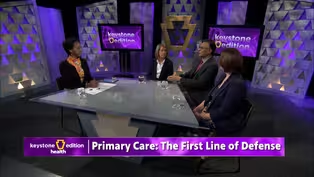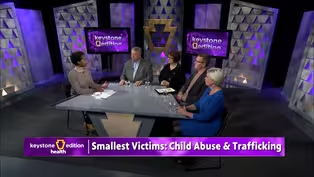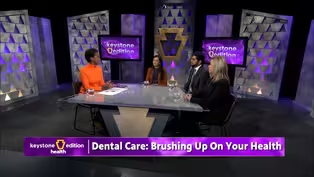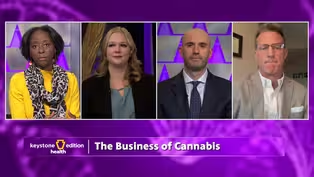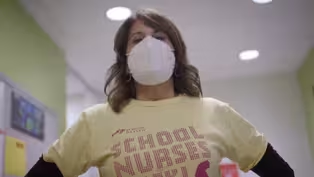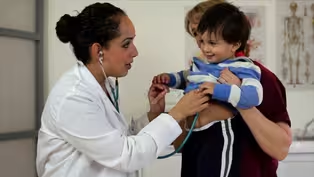Keystone Edition
School Nurses: Keeping Children Well
11/22/2021 | 27mVideo has Closed Captions
School nurses are on the front lines of meeting the health needs of students.
The school nurse serves in a pivotal role that bridges health care and education. Grounded by standards of practice, services provided by the school nurse include leadership, community/public health, care coordination, and quality improvement. School nurses are on the front lines of meeting the health needs of students.
Problems playing video? | Closed Captioning Feedback
Problems playing video? | Closed Captioning Feedback
Keystone Edition is a local public television program presented by WVIA
Keystone Edition
School Nurses: Keeping Children Well
11/22/2021 | 27mVideo has Closed Captions
The school nurse serves in a pivotal role that bridges health care and education. Grounded by standards of practice, services provided by the school nurse include leadership, community/public health, care coordination, and quality improvement. School nurses are on the front lines of meeting the health needs of students.
Problems playing video? | Closed Captioning Feedback
How to Watch Keystone Edition
Keystone Edition is available to stream on pbs.org and the free PBS App, available on iPhone, Apple TV, Android TV, Android smartphones, Amazon Fire TV, Amazon Fire Tablet, Roku, Samsung Smart TV, and Vizio.
Providing Support for PBS.org
Learn Moreabout PBS online sponsorshipMore from This Collection
Healthcare is constantly changing as technology finds new and better ways to help people live longer, healthier lives. Host Tonyehn Verkitus will address the issues that are important to the people in our community, including the ongoing pandemic, concerns about vaccines, food deserts, childhood trauma and child abuse, mental health, environmental issues, and the rising cost of staying healthy wit
Domestic Violence: Breaking the Silence
Video has Closed Captions
Access to the right resources can make facing this challenge a little easier for families (26m 59s)
In Sickness and in Play: Chronic Disease in Children
Video has Closed Captions
About 25% of children in the US aged 2 to 8 years have a chronic health condition (27m)
Video has Closed Captions
Homelessness can happen to anyone at any age or socio-economic status. (26m 59s)
Video has Closed Captions
As we raise the visibility on Transgender young adults and embrace them within our culture (26m 59s)
Video has Closed Captions
Obesity is a serious risk factor many try to avoid when developing healthy eating habits. (27m)
School Nurses: Answering the Call
Video has Closed Captions
What can our school districts do to help retain and recruit nurses for future generations? (27m)
Under the Weather? Climate Change & Your Health
Video has Closed Captions
How does climate change impact individual and public health? (54m 59s)
Barriers to Healthcare of Older Adults
Video has Closed Captions
What progress have local organizations made in addressing these challenges? (27m)
Primary Care: The First Line of Defense
Video has Closed Captions
When was the last time you saw your primary care doctor? (27m)
The Smallest Victims: Child Abuse & Trafficking
Video has Closed Captions
What are the signs to know to spot child abuse and even possible trafficking? (27m)
Dental Care: Brushing Up on Your Health
Video has Closed Captions
How can providers make dental care more affordable and accessible? (26m 59s)
Video has Closed Captions
What does the cannabis industry mean for Northeastern and Central Pennsylvania? (26m 59s)
Providing Support for PBS.org
Learn Moreabout PBS online sponsorship- [Speaker] Live from your Public Media Studios, WVIA presents Keystone Edition Health.
A public affairs program that goes beyond the headlines to address issues in Northeastern and Central Pennsylvania.
This is Keystone Edition Health and now moderator, Tonyehn Verkitus.
- Good evening and welcome to Keystone Edition Health.
I'm Tonyehn Verkitus.
Thank you for joining us.
Tonight we will meet frontline workers who are often forgotten by adults but never forgotten by children in schools, School Nurses.
From treating injuries to encouraging health through preventative screenings.
We'll take a look at how school nurses set students on the path to a healthy life.
First, let's hear from WVIA's Paul Lasar.
- [Paul] A school nurse's day includes far more than bandaging playground bumps and bruises.
For some students, the nurse serving their school becomes their most regular health provider.
The National Association of School Nurses reports that nurses help students manage chronic diseases, connect families with health resources and screen children for all manner of health concerns.
In Northeastern Pennsylvania, the Moses Taylor Foundation found local school nurses face under-staffing and a lack of resources and development opportunities like commodities throughout the country.
Through studies like the NEPA School Nurse Needs Assessment, the foundation hopes to address these issues and help school nurses better serve the students in their care.
For Keystone Edition Health, I'm Paul Lasar.
- Joining us tonight, we have Erin Keating, Superintendent of the Old Forge School District in Lackawanna County.
Also with us in studio tonight is Tracey Glynn-Roullinavage, certified school nurse with the Wilkes-Barre Area School District.
And joining us via zoom, we have Kathy Verbel, certified school nurse with the Stroudsburg Area School District.
She's also a past President of the Pennsylvania Association of School Nurses and Practitioners.
So Erin, I wanted to ask you first, what is it that school districts are hoping to accomplish with these school health programs?
- Well, every school has a requirement to have a school nurse for so many students.
So that's a requirement.
But there are some schools in our area districts who have expanded to school-based health centers.
And that's where they partner with a local medical provider.
And there is a practitioner, an NP, a PA or an MD in the building who comes in to provide primary and preventative care for students on school grounds and not remove the school students from the school.
- Kathy, you've been a school nurse for quite some time.
What are the requirements to be a certified school nurse?
- To be a certified school nurse in Pennsylvania, you have to have a typically a Bachelor's Degree in Nursing but it can actually be a Bachelor's Degree in any field.
Then you have to have a licensure, an RN Licensure in the state and complete a improved certification program which typically to achieve your Level 2 certification which you need is 24 post-baccalaureate credits.
- I know that there's only one nurse in the school.
What is the ratio of students per nurse?
And is there a maximum for the schools?
- Yes.
Well right now, thank you for having me, by the way.
Right now we have a one school nurse to over 1200 students in one of our schools.
For me personally, I have over 800 students in my elementary school.
And the state statute right now is one school nurse to 1500 students which is incredible.
- Yeah, I would imagine that the workload probably can be very intense at times.
How do you take care of yourself while taking care of students?
- One day at a time.
(Tracey laughs) I will give a shout out to my son and my daughter, Savvy and James.
I focus on the needs of myself one day at a time taking breaks, trying to focus on why I'm doing what I'm doing and the needs and the care of the students on a day to day basis is my priority.
- Erin, can you tell us a little bit about how primary and preventative care also affects the students in school, their grades, their attendance?
- Sure.
There's a ton of research out there that shows that students who don't have their primary and preventative medical care met, don't achieve properly in school.
It goes back to the theoretical basis of Maslow.
You need to meet your basic needs first before you can move up up the rung and go to the highest level.
So, when kids are sick they don't do as well.
And we know that as adults, I mean, prior to the pandemic, how many of us would go into work, push through a day when we didn't feel well.
And by the afternoon there was no way that you were performing at an optimal level.
So, students who aren't having either their acute or especially their chronic medical needs met are not performing where they should be because that's getting in the way of them doing their best.
- Kathy, can you share with us a little bit, how advances in medicine has changed the student population?
Because I'm sure you have a lot more students coming to school that may not have been able to in the past.
- That's exactly the case.
We see students now that we would never have seen before in schools.
Well, we're seeing children that are requiring two feedings, that are requiring different medical procedures, many with severe food allergies.
They may have implanted defibrillators beyond a ventilator.
We have children that are completely wheelchair bound and that need a nurse to take care of all their basic needs.
Children that may have frequent seizures that have implanted devices that will help stop their seizures.
So, it's just growing exponentially, the different things.
In addition to that, we're also seeing many more students with mental health concerns that may not have been diagnosed in the past, now they are.
So, we're working with those children also.
- Let's pause a moment and take a look at exactly what a day in the life of a school nurse looks like.
We followed Rebekah McFadden, School Nurse for the Weatherly Area School District to see just what the daily life of some of our panelists looks like today.
(acoustic guitar music) - We do need to have a four year bachelor degree and then there's a certification similar to what a teacher would be required.
I worked in a surgical and a medical ICU.
I worked in the emergency department and I loved working in a hospital.
But it also made me realize that if there had been early intervention to healthier lifestyle, maybe this person could have avoided being in this situation or being in this ICU bed.
I am working with these little people who have healthy bodies, who don't have chronic conditions and if I can help them choose a healthier lifestyle and put them in a better path for their life in general, then that's pretty cool.
We are truly, truly frontline with keeping our kids in the school and learning.
That's my job.
But we have kids with complex medical issues in our school buildings.
We need to make sure that there's a plan in place if there's a medical concern and those plans are something called a Medical Action Plan.
So we develop those with the parent.
Hi, it's Becky calling you.
Is this an okay time?
Like I love it because I don't know, I really know the families, like I've been here 20 years and now I have children of prior students.
And just to have that connection, it's been invaluable.
That is so important when a student is struggling with something emotionally.
I'm not a licensed counselor, but I talk to kids all the time and we know what the resources are in our community and we can help.
I remember 10 years ago, I was just doing the mandated screening and I always say to the kid after we're done with the screening or the student, you know, do you have any concerns or worries that you'd like to talk about?
And the student just started to cry.
And I said, are you okay?
Is there something you wanna talk about?
She was maybe 16 or 17 and she said, I'm not okay.
She said, I am struggling with my emotions and I don't want to do and I just don't feel like I can burden my parents with that right now.
And so we talked for quite some time, you know, obviously I asked permission, can we have that conversation together with your parents?
And we did.
And that student was able to get support, get help.
School nurses and that role can never go away.
It's teachers (Beth speaking over the radio) This is the nurse.
Go ahead.
- [Beth] Would you be able to call the office, please?
- I'll be right out, Beth.
So sorry.
Usually non-stop.
- Tracey, can you tell us a little bit about how you view view your role in the school?
Obviously, based on what Rebekah said, it's more than just Booboos, right?
You're taking care of other, maybe emotional needs.
- Oh absolutely.
We see the kid probably for a few minutes a day.
But in that few minutes we are responsible to figure out a whole bunch of issues sometimes.
Whether be psychosomatic, we are trained in assessment skills.
Whether they do just in fact have a bellyache, it could be for so many reasons.
We also are mandated to health screenings.
We do growth screenings.
We do vision and hearing screenings.
And also we're managing at the same time, their chronic and acute medical concerns.
We also are looking for vaccination compliance and immunization compliance which is a whole another ball game and we need another set of arms and legs to do.
But we generally can take care of the entire individual as Erin said, have them perform to their academic potential because when they're not well, they're not able to do that.
- Erin, Tracey just mentioned screenings.
Can you talk to us a little bit about how some of these requirements are changing the dynamics of the health programs in school?
- It's more that.
What people have realized is school's a catch-all.
So, school is a place where, you know, you have a shot to get that population of children to be ensured that they have certain things.
So that's where the vaccination requirements come in.
That's where mandatory physicals come in some years, mandatory dental screenings.
We have vision screenings.
You know, right now in the pandemic, you're looking at schools being the hub of vaccination centers for our young students.
We're doing COVID testing, rapid testing and pool testing right in the confines of buildings because it's easier to have that captive student audience in a school than it is to try to get your arms around all of those students once they leave the school.
So, there's a lot of mandates that fall on the school nurse.
And then they're all reportable through the school nurse and the superintendent to the Department of Health on an annual basis to make sure that we're doing the right things to meet those needs for all of our students.
And I think the pandemic has been a game changer for all of us with reporting requirements, with transparency and numbers in cases, with running vaccine clinics.
I mean, there's a lot of the school becoming the center for these health services.
- I hadn't really thought about it but you talk about having a captive audience.
This probably allows you to let information percolate back out to the families as well.
So you're not just serving the students but potentially families.
- Sure.
And it's really the overall whole wellness of a child.
Within the confines of a school you're meeting their physical health, you're meeting their mental health through things like school and community-based behavioral health teams where there's Tele-psychiatry happening right inside the confines of the school.
Our nurses are doing Med Management for students and we're making the referrals out for students who we think need additional services or need a professional to look at them in a diagnostic manner.
So there's a lot taking place within the confines of a school to make sure that we're doing the best for kids.
And that also goes to their overall wellness.
We're making sure we're having food pantries or we're partnering with people locally for food insecurity or even for housing insecurity.
Schools really become that one-stop shop to try to get kids, everything that they need so we can make them as safe as healthy as impossible and they can learn.
- Tracey.
We spoke a little bit about some of the programs that you have at your school for children.
I think this is a nice segue to bring that up.
- Yes, we do our best as school nurses like Erin said, to treat the family as well.
Because if they need resources to take care of their children, they can further provide that guidance to get them in school every day and have them not miss a whole ton of school due to illness or due to lack of resources, transportation, medication, groceries, clothes.
So our Nurse's Pantry is one program that we are honored to be working with the United Way.
And our Nurse's Pantry is utilized every day if not multiple times a day by myself to help our students be the best that they can be every day, whether it be clothes, I have a washer and dryer that was donated and paid for by United Way donations.
I can, if for a spill, I could keep the children in school.
I have hygiene supplies.
I have head lice kits, treatment kits where the parents might not be able to get to the store.
And if they can, they don't have the money to buy it.
They can't afford it.
So I can give that to them to get their needs met without having to have an incredible time out of school and many absences that can cause learning issues and catching up.
- Kathy, we talked a little bit about partnering with the parents, (Tonyehn clears throat) Excuse me on there.
choose children's health and school readiness.
Can you tell us a little bit about how you do this?
- Essentially, I feel that the partnering starts when the child is either enrolled or we first need the child and the parent that they move up into the school.
Just like Tracey said, we have many resources available.
So, we really want parents to reach out.
If children have chronic health conditions typically I know myself, I would reach out to the parent.
I talk to them, I'd see what the concerns are, what the child is doing to manage that condition at home and what we can do at school to help them be accessible as possible or to put different accommodations and plans in place to allow them to have a great day at school every day.
The children that we may not routinely reach out to, we would wanna encourage parents to reach out to.
For instance, if a child, as Tracey mentioned, we do vision screenings on all our students every year.
So, if a child failed their vision screening and perhaps the parents don't have vision insurance or they don't have the money for the copay or to pay for the glasses or glasses are broken.
If they would reach out to the nurse, many of us have different resources and options.
There's a program through our National Association of School Nurses to be able to get gift certificates for free eye exams and glasses.
So, we have a lot of resources available that could maybe help families.
- So we talked a little bit about the mandated reporting.
When I was speaking to all of you, I had to admit that I was one of the horrible parents that didn't always send my forms back immediately.
(indistinct) Yeah, exactly.
And now I know that it makes a difference.
But how is this reporting use to implement or change programs within the schools.
- The actual reports that are done, I mean, you look for where you see need.
You know, one of the things that I believe, Tracey, you talked about was mental health needs.
That's where you look to partner to bring in outside services, social workers, school and community-based behavioral health centers to meet those mental health needs.
Schools partner with private dentists, with companies to bring dentists in.
I worked in an urban school district where they had a portable dental chair and they would fill cavities right in the confines of the school to meet the kids' needs right there within the confines of the school.
You have your health screenings where the school physician is brought in to make sure that everyone has a physical.
So, it's not just folks who are lucky enough to have insurance and have a pediatrician and could get to that person.
So, we use our local resources to meet those needs of those kids inside the confines of the school.
- Kathy, I'm gonna go back to students with chronic diseases, again because I know this is a huge issue in the school, not an issue but as service you're happy to help, take care of.
But at what point do you think that this increase in students with chronic diseases started and was it a slow increase or did it kind of just happen exponentially?
- I finished school nurse for over 20 years and I don't know if Tracey would agree with me, but I feel that it's just been a constant upward slope that we're seeing more kids, different conditions.
But in addition to that, a lot of things have changed in the way that we manage these same conditions now.
So that things that may have been taken care of with a medication or injection, now, for instance, children with diabetes, we're now managing insulin pumps and dealing with programs on computers and things to monitor conditions and forward that to physicians or forward that to parents.
So, besides the conditions, the way we are managing conditions has changed tremendously.
- Do you think Erin that the school nurses are helping to not just fill a void for primary care but in rural districts where there aren't physicians, might students use the school nurse in place of that?
- I don't think it's even just rural districts.
I think it's where you see poverty.
People don't have a pediatrician or they're uninsured or under-insured.
So, what they do is they say, when you get into school in the morning, go and see the school nurse and that school nurse becomes the triage source for that child to make a determination if a referral to a medical diagnostician is needed or, you know, if the kid can remain in school or if the student needs to go home or what needs to happen.
And I think that, you know, you see it sometimes and it's quite sad with falls off bikes, with cuts, with bruises, you know, it's not just colds and sniffles and Booboo bellies that end up in the nurse's office anymore.
You know, these folks are truly triaging serious medical conditions.
- And Tracey, what value do you think you're bringing to these families?
We talked a little bit about holistic care.
So beyond helping with the Booboos, helping with the diabetes, insulin injections, what other values are you bringing?
- I feel every day that there is something that we can help the children through, whether it be a problem at home, whether it be a problem in class, whether it be a problem with a sibling.
We are looking at the child holistically like you said, not just emotional, not just mental, not just physical but encompassing everything that you need to stay well.
As Erin said before about triage, I have so many kids that come to the nurse and they do say, what did your parents say?
Did you tell them before you left school?
And they say, nope, they told me to come to the nurse which to me, you know, we are needed.
We are, you know, valuable.
And we have a lot of resources that we can lend and information to the parents.
We have a program that I failed to mention before, but called, See to Succeed.
We partner with United Way in The Wright Center for a program that our Director, Dr. Rochelle Corey helped us navigate through.
As Kathy mentioned, we send out referrals for vision failures.
When we do a screening, a child gets a paper, sent home to mom that says your child was vision screened in school today and they did not pass.
So, we are looking for them to go see an eye doctor, maybe get a prescription, get a full examination and comprehensive eye examination and then return that paper to us.
Parents don't have the resources that they need to complete that.
So we don't get them back for two, for three, for four years.
We see these children suffer academically because a lot of the academic struggles are based from visual disturbances.
And if we can catch those and help with that, that gives us a daily satisfaction to know we are helping these children immensely.
So this program allows children to get a comprehensive eye exam, right on campus.
We have a mobile eye clinic with an optometrist and an optician to deliver glasses to under-insured and uninsured families through the grant from the United Way.
- Well, I can thank a school nurse for realizing that my youngest needed glasses when she was in daycare, they just told us she was clumsy.
(all laugh) - [Tracey] Exactly.
- But really she needed glasses.
- Yes.
And a lot of the children could be labeled so to speak as emotional support or learning support when in fact they can't see.
- Right.
Kathy, of course we have to bring up COVID.
We would like to believe that it wouldn't be part of the conversation.
But I would imagine that this drastically changes some of what's happening in school and there's all these new requirements that are gonna be put in place because of COVID.
How has that made the life of a school nurse more difficult?
- This life of a school nurse, it has honestly just, it's made it much more complicated and in required us to be very creative.
And honestly I don't know if you would say quadrupled or more the workload, Tracey, at least but school nurses are doing everything that we did before.
All the things that we've both mentioned, this just puts it in a whole different light.
So, whereas we may have been able to do classroom screenings for vision and bring all the children down and be able to screen their hearing as a group.
Now we can't do that because we can't bring them together.
It has to be done individually, equipment has to be cleaned down between that, we are coming up with ways to distance ourselves, we're using barriers to do vision screenings.
And we're, I know myself, I reverted back to using charts where we used to use machines.
So, we just tried to really become flexible and creative and use each other as a resource to come up with ways to do things.
- You spoke a little bit about COVID Champions.
Can you tell us a little bit about that?
- Yes.
In our district we do not have a COVID Champion.
We are, the school nurses and the administrators are the COVID Champions.
As Kathy mentioned, it has at least quadrupled our workload with being available to answer emails, call parents, call the Department of Health, send emails, make phone calls and contacts regarding quarantine dates and testing results, notify the teachers.
What is the quarantine date?
Are these absences going to be excused?
Are they returning on a certain date?
Do we need to look for a doctor's note?
I mean, it's endless.
We try to do our daily tasks, our daily screenings which is not humanly possible but we do our best like Kathy said.
- I have to say I have so much respect for school nurses after the conversations that I've had with all of you.
We would like to thank all of our guests for joining us.
And thank you for watching Keystone Edition Health.
I'm Tonyehn Verkitus.
Have a good evening.
(dramatic music)
A Day in the Life of a School Nurse
Video has Closed Captions
Clip: 11/22/2021 | 3m 1s | Follow Weatherly Area School District Nurse Rebekah McFadden through a day on the job (3m 1s)
School Nurses: Keeping Children Well - Preview
Preview: 11/22/2021 | 30s | Watch Monday, November 22nd at 7pm on WVIA TV (30s)
Providing Support for PBS.org
Learn Moreabout PBS online sponsorship
- News and Public Affairs

Top journalists deliver compelling original analysis of the hour's headlines.

- News and Public Affairs

FRONTLINE is investigative journalism that questions, explains and changes our world.












Support for PBS provided by:
Keystone Edition is a local public television program presented by WVIA
